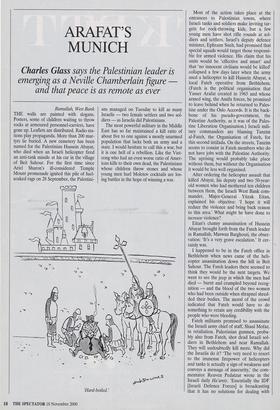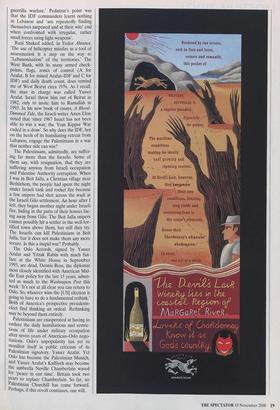ARAFAT'S MUNICH
Charles Glass says the Palestinian leader is
emerging as a Neville Chamberlain figure - and that peace is as remote as ever
Ramallah, West Bank THE walls are painted with slogans. Posters, some of children waiting to throw rocks at armoured personnel-carriers, have gone up. Leaflets are distributed. Radio sta- tions play propaganda. More than 200 mar- tyrs lie buried. A new cemetery has been named for the Palestinian Hussein Abayat, who died when an Israeli helicopter fired an anti-tank missile at his car in the village of Beit Sahour. For the first time since Ariel Sharon's ill-considered Temple Mount promenade ignited this pile of fuel- soaked rags on 28 September, the Palestini- ans managed on Tuesday to kill as many Israelis — two female settlers and two sol- diers — as Israelis did Palestinians.
The most powerful military in the Middle East has so far maintained a kill ratio of about five to one against a mostly unarmed population that lacks both an army and a state. I would hesitate to call this a war, but it is one hell of a rebellion. Like the Viet- cong who had an even worse ratio of Amer- ican kills to their own dead, the Palestinians whose children throw stones and whose young men hurl Molotov cocktails are los- ing battles in the hope of winning a war.
Hard-boiled.' Most of the action takes place at the entrances to Palestinian towns, where Israeli tanks and soldiers make inviting tar- gets for rock-throwing kids, but a few young men have shot rifle rounds at sol- diers and settlers. Israel's deputy defence minister, Ephraim Sneh, had promised that special squads would target those responsi- ble for armed violence. His claim that his units would be 'effective and smart' and that `no innocent civilians would be killed' collapsed a few days later when the army used a helicopter to kill Hussein Abayat, a local Fateh operative from Bethlehem. (Fateh is the political organisation that Yasser Arafat created in 1965 and whose armed wing, the Assifa forces, he promised to leave behind when he returned to Pales- tine under the Oslo Accords. It is the back- bone of his pseudo-government, the Palestine Authority, as it was of the Pales- tine Liberation Organisation.) Israeli mili- tary commanders are blaming Tanzim al-Fateh, the Organisation of Fateh, for this second intifada. On the streets, Tanzim seems to consist in Fateh members who do not have jobs with the Palestine Authority. The uprising would probably take place without them, but without the Organisation it would be less well organised.
After ordering the helicopter assault that killed Abayat, his deputy and two 50-year- old women who had mothered ten children between them, the Israeli West Bank com- mander, Major-General Yitzak Eitan, explained his objective: 'I hope it will reduce the violence and bring back reason to this area.' What might he have done to increase violence?
Eitan's clumsy assassination of Hussein Abayat brought forth from the Fateh leader in Ramallah, Marwan Barghouti, the obser- vation: 'It's a very grave escalation.' It cer- tainly was.
I happened to be in the Fateh office in Bethlehem when news came of the heli- copter assassination down the hill in Beit Sahour. The Fateh leaders there seemed to think they would be the next targets. We went to see the jeep in which the men had died — burnt and crumpled beyond recog- nition — and the blood of the two women who had been outside when shrapnel shred- ded their bodies. The mood of the crowd indicated that Fateh would have to do something to retain any credibility with the people who were bleeding.
Fateh militants promised to assassinate the Israeli army chief of staff, Shaul Mofaz, in retaliation. Palestinian gunmen, proba- bly also from Fateh, shot dead Israeli sol- diers in Bethlehem and near Ramallah. They will undoubtedly kill more. Why did the Israelis do it? 'The very need to resort to the immense firepower of helicopters and tanks is actually a sign of weakness and conveys a message of insecurity,' the com- mentator Reuven Pedatzur wrote in the Israeli daily Ha'aretz. 'Essentially the IDF [Israeli Defence Forces] is broadcasting that it has no solutions for dealing with guerrilla warfare.' Pedatzur's point was that the IDF commanders learnt nothing in Lebanon and 'are repeatedly finding themselves surprised and at their wits' end when confronted with irregular, rather small forces using light weapons'.
Rani Shaked added, in Yediot Ahranot, `The use of helicopter missiles as a tool of assassination is a step on the way to "Lebanonisation" of the territories.' The West Bank, with its many armed check- points, flags, zones of control (A for Arafat, B for mixed Arafat—IDF and C for IDF) and daily death count, does remind me of West Beirut circa 1976. As I recall, the man in charge was called Yasser Arafat. Israel threw him out of Beirut in 1982, only to invite him to Ramallah in 1993. In his new book of essays, A Blood- Dimmed Tide, the Israeli writer Amos Elon noted that 'since 1967 Israel has not been able to win a war; the Yom Kippur War ended in a draw'. So why does the IDF, hot on the heels of its humiliating retreat from Lebanon, engage the Palestinians in a war that neither side can win?
The Palestinians, admittedly, are suffer- ing far more than the Israelis. Some of them say, with resignation, that they are suffering anyway from Israeli occupation and Palestine Authority corruption. When I was in Beit Jalla, a Christian village near Bethlehem, the people had spent the night under Israeli tank and rocket fire because a few snipers had shot across the wadi at the Israeli Gilo settlement. An hour after I left, they began another night under Israeli fire, hiding in the parts of their houses fac- ing away from Gilo. The Beit Jalla snipers cannot possibly hit a settler in the well-for- tified town above them, but still they try. The Israelis can kill Palestinians in Beit Jalla, but it does not make them any more secure. Is this a stupid war? Probably.
The Oslo Accords, signed by Yasser Arafat and Yitzak Rabin with much fan- fare at the White House in September 1993, are dead. Dennis Ross, the diplomat most closely identified with American Mid- dle East policy for the last 15 years, admit- ted as much to the Washington Post this week: 'It's not at all clear you can return to Oslo. So, whoever wins the [US] election is going to have to do a fundamental rethink.' Both of America's prospective presidents- elect find thinking an ordeal. Rethinking may be beyond them entirely.
Palestinians are exasperated at having to endure the daily humiliations and restric- tions of life under military occupation after seven years of American—Oslo nego- tiations. Oslo's unpopularity has yet to manifest itself in public criticism of its Palestinian signatory, Yasser Arafat. Yet Oslo has become the Palestinian Munich, and Yasser Arafat's Kaffiyeh may become the umbrella Neville Chamberlain waved for 'peace in our time'. Britain took two years to replace Chamberlain. So far, no Palestinian Churchill has come forward. Perhaps, if this revolt continues, one will.



































































































 Previous page
Previous page